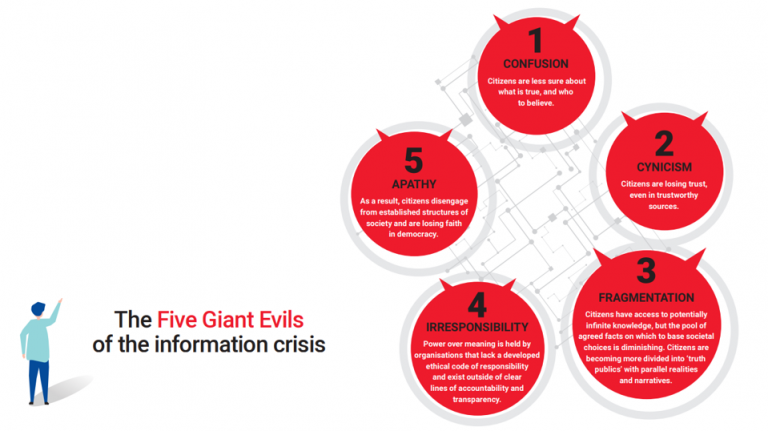It probably goes without saying that society is suffering a crisis of trust in the information it receives. Technology has given us access to more information than ever before, but it has also facilitated the spread of misinformation on an industrial scale. A new report from the London School of Economics outlines not only the problems this causes, but presents a structural approach to solving what they believe to be a systemic problem.
The report identifies five evils of the information crisis – confusion, cynicism, fragmentation, irresponsibility and apathy.
The challenges presented by misinformation are a topic I’ve touched upon numerous times before, so I’ll focus instead on the framework the authors propose to rectify matters.
They argue that the responses to date have had limited success in large part because they have been undertaken in isolation. This has led to coordination problems both vertically and horizontally along the value chain, often between firms that ostensibly compete against one another. Relying on the enlightened self-interest of the market is unlikely to yield the results we strive for, so there has to be a more systemic approach.
No magic bullet
The five evils identified in the report requires a systemic approach that involves all stakeholders working together.
“We argue for an approach with a long-term horizon that runs with the grain of existing initiatives by news media, by publishers and other stakeholders, but which provides for the capacity to evaluate where their limitations are likely to be found,” the authors write. “In contrast to almost all of the attempts to develop new policy in this area, we take a systemic approach to the information crisis problem and propose a set of short-, medium- and long-term solutions.”
A first step is to establish an ‘independent platform agency’ (IPA) that is funded by a levy on social media and search advertising revenue. This agency would report to government but act independently of it and provide an observatory and policy advice function. It should do things such as reporting on trends in news and information sharing, on the effectiveness of self-regulation in the sector and support the mobilisation and coordination of stakeholders to ensure the effectiveness of any actions.
“The IPA would collaborate with existing regulators to report on the effectiveness of self-regulation and news credibility signalling measures across the UK media system,” the authors recommend. “The IPA should be empowered to make recommendations to Government, or relevant regulators, about the legal duties of platforms, and to monitor compliance with those duties, once legislated for.”
Improving media literacy
Alongside this, the authors also urge more to be done to improve media literacy in order to better inform people about what’s fake and what isn’t. They believe that whilst efforts do undoubtedly need to be taken to allow us to take better personal responsibility for the news we consume, education cannot be seen as an answer in itself.
Nonetheless, the authors believe that an integrated program of media literacy can yield strong results for both children and adults. It’s important that this is an enduring effort rather than a one-off campaign, but they believe it will reap dividends, especially in the longer-term.
What is clear however is that this is such an important issue, and that poor information undermines the very fabric of our democracies. It’s an issue that needs concerted effort from all stakeholders to give society back its faith in the information that is its lifeblood.
“The alternative to setting up a transparent institution that is independent of government and established by law will be to continue with muddling through and opaque fudging, and with the delegation of censorship to private bodies, further compounding the crisis of truth and trust,” the authors urge. “The time for decisive action to end the information crisis is now.”
